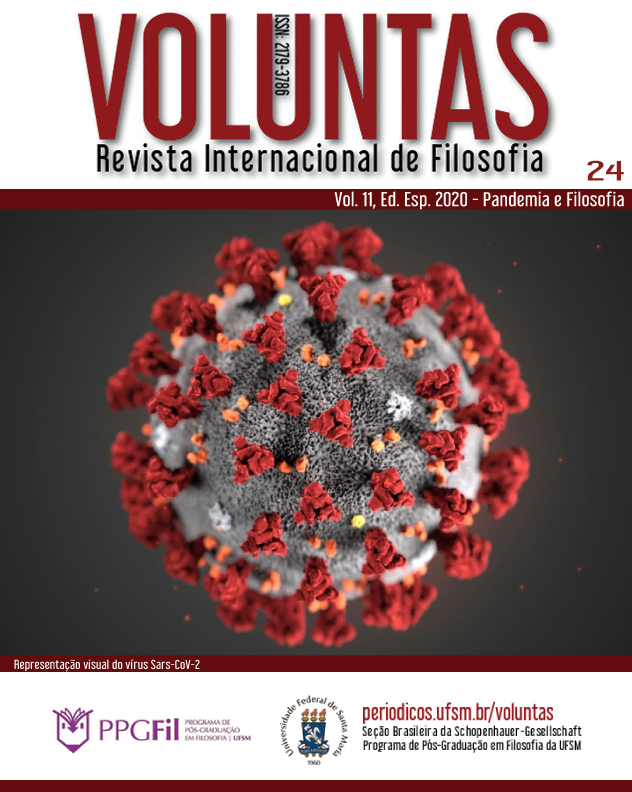Scientific models in times of pandemic
DOI:
https://doi.org/10.5902/2179378643857Keywords:
Scientific models, Epidemiological models, COVID-19, Pandemic, Projection, Science in the mediaAbstract
The COVID-19 pandemic has given greater visibility to the work of epidemiologists, and in particular to the use of epidemiological models. Projections of the disease’s expansion, number of cases and its expected peak, are widely reported in the media. Public health policies, such as measures of social isolation, are justified to the population based on the need to ‘flatten the curve’, and to prevent the collapse of the health system. But the public is not informed about uses and limitations of models. The need to recalibrate models with new data and to revise projections are also poorly understood and sometimes become a source of frustration, fuelling scepticism towards scientific truth. In this article, I briefly discuss how philosophical reflection on the uses of models and their epistemic properties - cognition, explanation and understanding - can mitigate these problems.Downloads
References
BASTOS, S.; CAJUEIRO, D. Modeling and forecasting the early evolution of the Covid-19 pandemic in Brazil. Cornell University: Quantitative Biology (manuscrito enviado em 31 mar. 2020 (pre-print). Disponível em: https://arxiv.org/abs/2003.14288 Acessado em: 08 abr. 2020.
CARTWRIGHT, N. The Simulacrum Account of Explanation. In: How the Laws of Physics Lie. Oxford: Oxford University Press, 1983.
ELGIN, C. True Enough. Cambridge, MA: MIT Press, 2017.
EUSTÁQUIO, O. Etíope, diretor-geral da OMS é líder comunista radical corrupto e garoto propaganda do Covid-19. Agora Paraná, 25 mar. 2020. Disponível em: https://www.agoraparana.com.br/noticia/etiope-diretor-geral-da-oms-e-lider-comunista-radical-corrupto-e-garoto-propaganda-do-covid-19 Acessado em: 19 jun. 2020.
FISHER, I. The Mechanics of Bimetallism. The Economic Journal, v. 4, n. 15, p. 527-537, 1894.
FRIGG, R.; HARTMANN, S. Models in Science. The Stanford Encyclopedia of Philosophy, 2020. Disponível em https://plato.stanford.edu/archives/spr2020/entries/models-science/ Acesso em: 21 abr. 2020.
HEMPEL, C.; OPPENHEIM, P. Studies in the Logic of Explanation. Philosophy of Science, Chicago, v. 15, n. 2, p. 135-175, 1948.
HETHCOTE, H. Three Basic Epidemiological Models. In: Levin, S. (Org.). Applied Mathematical Ecology. Berlin: Springer, 1989.
HETHCOTE, H.; YORKE, J. Gonorrhea Transmission Dynamics and Control. In: Levin, S. (Org.). Lecture Notes in Biomathematics. Berlin: Springer, 1984.
KAHN-HARRIS, K. Denialism: what drives people to reject the truth. The Guardian, 3 ago. 2018. Disponível em: https://www.theguardian.com/news/2018/aug/03/denialism-what-drives-people-to-reject-the-truth Acesso em 19 jun. 2020.
KARGON, R.; ACHINSTEIN, P. (Orgs.) Kelvin’s Baltimore Lectures and Modern Theoretical Physics. Cambridge, MA: MIT Press, 1987.
KENDALL, J. America's Devastating First Plague and the Birth of Epidemiology. Time, 4 abr. 2020. Disponível em: https://time.com/5815099/america-first-plague-birth-epidemiology/ Acesso em 18 abr. 2020.
MARKOVITS, H. Model-Based Reasoning. In: Seel N. (Org.) Encyclopedia of the Sciences of Learning. Boston, MA: Springer, 2012.
MILL, J. S. A System of Logic, Ratiocinative and Inductive: Being a Connected View of the Principles of Evidence, and the Methods of Scientific Investigation. Cambridge: Cambridge University Press, 2011 [1843].
MORGAN, M. Learning from Models. In: Morgan, M.; Morrison, M. (Orgs.). Models as Mediators: Perspectives on Natural and Social Science. Cambridge: Cambridge University Press.
ROGERS, S. John Snow's data journalism: the cholera map that changed the world. The Guardian, 15 mar. 2020. Disponível em: https://www.theguardian.com/news/datablog/2013/mar/15/john-snow-cholera-map Acesso em: 19 abr. 2020.
SHAFTEL, N. The Evolution of American Medical Literature. In: Martí-Ibáñez, F. History of American Medicine: A Symposium. New York: MD Publications, 1959.
STREVENS, M. Why Explanations Lie: Idealization in Explanation. In: Depth: An Account of Scientific Explanation. Boston: Harvard University Press, 2008.
SWOYER, C. Structural Representation and Surrogative Reasoning. Synthese, v. 87, n. 3, p. 449-508, 1991.
TUFEKCI, Z. Don’t Believe the COVID-19 Models. The Atlantic, 02 abr. 2020. Disponível em: https://www.theatlantic.com/technology/archive/2020/04/coronavirus-models-arent-supposed-be-
right/609271/ Acesso em: 19 abr. 2020.
Downloads
Published
How to Cite
Issue
Section
License
Copyright (c) 2020 Voluntas: International Journal of Philosophy

This work is licensed under a Creative Commons Attribution-NonCommercial-ShareAlike 4.0 International License.
The submission of original manuscripts to this journal implies the transference, by the authors, of the copyrights for printed and digital publication. The copyrights of a published manuscript belong ultimately to the author, and only the copyright for its first publication is reserved to the journal. Authors may only use the same results in other publications explicitly indicating this journal as the medium of the original publication.
Licence
Attribution-NonCommercial-ShareAlike 4.0 International (CC BY-NC-SA 4.0) - This license lets others remix, tweak, and build upon your work non-commercially, as long as they credit you and license their new creations under the identical terms.






